 Petzlover
Petzlover Kanni is originated from India but Scottish Deerhound is originated from United Kingdom. Kanni may grow 14 cm / 5 inches shorter than Scottish Deerhound. Kanni may weigh 28 kg / 61 pounds lesser than Scottish Deerhound. Kanni may live 7 years more than Scottish Deerhound. Kanni may have less litter size than Scottish Deerhound. Both Kanni and Scottish Deerhound requires Low Maintenance.
Kanni is originated from India but Scottish Deerhound is originated from United Kingdom. Kanni may grow 14 cm / 5 inches shorter than Scottish Deerhound. Kanni may weigh 28 kg / 61 pounds lesser than Scottish Deerhound. Kanni may live 7 years more than Scottish Deerhound. Kanni may have less litter size than Scottish Deerhound. Both Kanni and Scottish Deerhound requires Low Maintenance.
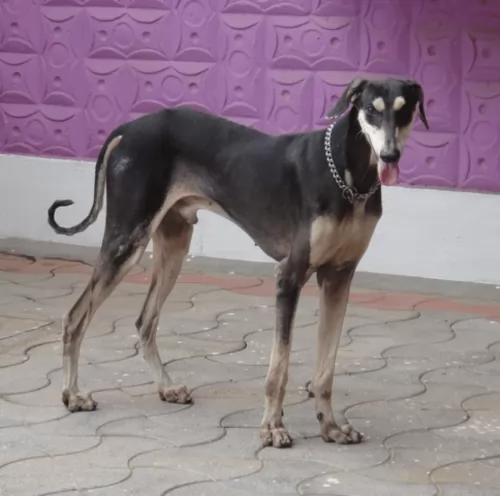 The Kanni dog is a rare South Indian Sighthound. It is also known as the Maiden's Beastmaster and this is because it is known to be protector and defender of its owner's property.
The Kanni dog is a rare South Indian Sighthound. It is also known as the Maiden's Beastmaster and this is because it is known to be protector and defender of its owner's property.
During ancient times, the dog was used for hunting but today it is essentially kept as a pet and it is registered with the Kennel Club of India.
 The Scottish Deerhound is considered the Royal Dog of Scotland. It is a sighthound that is large and bred to hunt large Red Deer. They are similar in appearance to the Greyhound, but they are bigger and heavier. Closely related to the Irish Wolfhound, they were used in creating it. The Scottish Deerhound is an ancient breed that is now very rare. It can trace its lineage to the 16th and 17th centuries.
The Scottish Deerhound is considered the Royal Dog of Scotland. It is a sighthound that is large and bred to hunt large Red Deer. They are similar in appearance to the Greyhound, but they are bigger and heavier. Closely related to the Irish Wolfhound, they were used in creating it. The Scottish Deerhound is an ancient breed that is now very rare. It can trace its lineage to the 16th and 17th centuries.
The Deerhound was a favorite of hunting nobility and could not be kept by any person or household that did not have at least the rank of earl. Despite this history the Scottish Deerhound was not considered separate from the Highland Greyhound and other staghounds until the 19th century. They were bred to stalk or “course” the red deer and were used extensively for this purpose until the beginning of the 20th century. At that time there was a need for smaller, slower deer tracking dogs.
At the start of the 20th century, the land for deer hunting had grown smaller and so had the deer. Also, the invention of the rifle made the fast Deerhounds who could cover large tracks of ground in minutes, no longer a necessity for successful hunting. As the clan systems fell and the nobility rose, the Deerhounds became the dog for nobility and landowners. There were a few non-nobilities who also kept them and hunted with them. As they were less needed for hunting a few households kept them as show dogs.
In the United States and Canada, both the Scottish Deerhound and the Greyhound were used for hunting wolves and deer. In Australia, the Kangaroo Dog – a deerhound crossbreed, and Deerhounds were used to hunt wild boar, emu and kangaroos. The Deerhound is one of the oldest of the breeds that are Greyhound-like. The Deerhound is not as fast as the Greyhound if they are running on a smooth surface. Get them on a rough surface and the will out that Greyhound. They appear to be larger and rougher than they really are. This gives them an advantage over the lighter, smaller Greyhound.
The Deerhound was a contributor to development of the Irish Wolfhound toward the end of the 19th century.
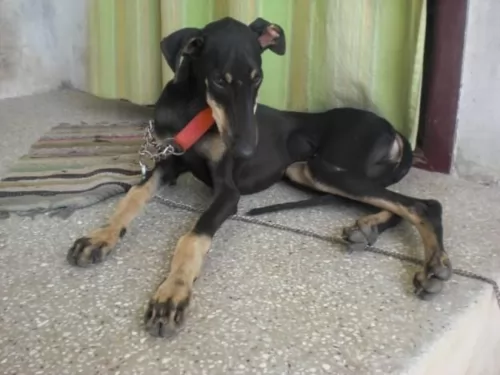 These dogs are tall, slim and deep chested, coming in two-color combinations, but it is the black and tan variety that is the true Kanni. There is also a cream variety. There are other color variations and each color has a unique name connected to it. The coat of the Kanni is short and smooth.
These dogs are tall, slim and deep chested, coming in two-color combinations, but it is the black and tan variety that is the true Kanni. There is also a cream variety. There are other color variations and each color has a unique name connected to it. The coat of the Kanni is short and smooth.
They are medium sized dogs standing at 62 to 67cm at the withers and weighing in the region of 18 – 22kg. When you first look at these dogs you might think of them as being similar to a Greyhound in looks. This is also because of their lean, muscular looks.
The eyes are a golden color, the nose black and the ears are a medium size and floppy with the long tail being semi-curved.
The Kanni has always been a hunting dog so he is used to being sharp, strong-willed, independent and alert as well as having some aggressive tendencies. It is also quite a reserved dog but he shows love and loyalty to his owner. He is independent and easy to train. It is a good thing to have him trained and socialized so that he is obedient to the simple commands you give him.
 The Scottish Deerhound looks a lot like the Greyhound, except it is heavily boned and larger in size. The Deerhound is also different in several other ways. Instead of the Greyhound, the Scottish Deerhound is more closely related to the Irish Wolfhound than the Deerhound. The Deerhound is a large, rough coated breed. It is a very tall breed; in fact, it is the tallest of all sighthounds.
The Scottish Deerhound looks a lot like the Greyhound, except it is heavily boned and larger in size. The Deerhound is also different in several other ways. Instead of the Greyhound, the Scottish Deerhound is more closely related to the Irish Wolfhound than the Deerhound. The Deerhound is a large, rough coated breed. It is a very tall breed; in fact, it is the tallest of all sighthounds.
The Deerhound has a long head with a flat skull and a muzzle that tapers at the end. They have dark eyes and a scissor bite with a tail that can be either curved or straight. The hair on their tails almost touches the ground. The rest of its coat is wiry and harsh with a beard, mustache and mane. The ears are soft and can be either held semi erect or folded against their head. Their coat is gray or grey-blue today but in the past, it might have been brindle, red fawn or yellow.
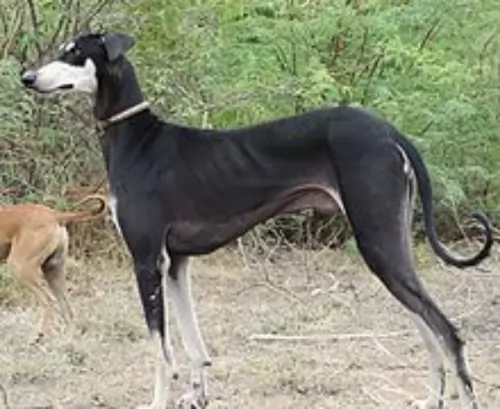 The Kanni looks much like your regular Doberman Pinscher but he has long tail and floppy ears. He is slim and agile but also powerful being able to have bursts of speed. It is why he requires a large place to run and play in, being better suited to a home with a large garden or farm.
The Kanni looks much like your regular Doberman Pinscher but he has long tail and floppy ears. He is slim and agile but also powerful being able to have bursts of speed. It is why he requires a large place to run and play in, being better suited to a home with a large garden or farm.
He is a playful, quiet dog but he has quite a bark on him and is known to be a good watchdog because of this. He is a protective dog too, devoted and loyal and making a splendid family pet.
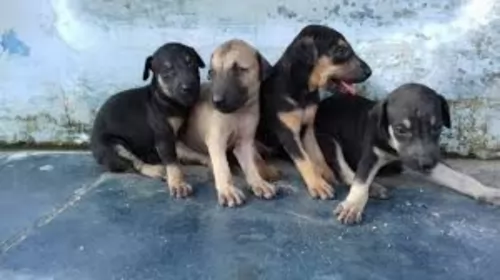 Not much is known about inherited health problems in this breed, and he can live up to a ripe old age of 16. It seems a pretty healthy dog, but still it helps to be aware of some of the more common dog illnesses that your pet can succumb to.
Not much is known about inherited health problems in this breed, and he can live up to a ripe old age of 16. It seems a pretty healthy dog, but still it helps to be aware of some of the more common dog illnesses that your pet can succumb to.
For first time dog owners it can be difficult knowing what health problems our beloved pets could suffer from. Every dog breed has certain diseases to which they are more prone to, but these are some common issues that most of our 4-legged friends will face -
This is a common dog health problem in India with the Kanni. There are so many things that disagree with their digestion. Most dogs may not want to eat their next meal, but when he is lethargic, he is hot and is vomiting, it is time to get your pet to the vet. This is because diarrhea causes rapid dehydration in dogs. To avoid diarrhea, steer clear of certain foods such as milk and dairy products as well as old, spoiled fatty foods. With diarrhea your dog must always have access to fresh, cool water.
This is a common dog disease, and ear infections can be painful and frustrating for your pet. He’ll scratch at his ear, shake his head and the inside of the ear may be red with a discharge. Check his ears for redness and try to keep them free from wax build up and dust.
Cleaning the ear is quite simple, and if you’re not sure how, the vet can do it quickly and effectively. Usually some dog ear cleaning solution on some cotton wool can do the trick. Ear infections are common in dogs like the Kanni with floppy ears.
It is essential to control fleas on your dog from word go. Fleas thrive in warm temperature and humidity and your pet will scratch, bite and lick at the spot. When you brush your pet, look through his fur for fleas and tell you vet about it if you discover ticks and fleas. A topical ointment could nip the problem in the bud. You may want to consider a flea collar for your pet.
Tapeworms, hookworms and roundworms for instance are commonly found in dogs, and even for healthy dogs, deworming tablets should be given from time to time. If your dog has worms, you’ll notice lethargy, loss of appetite, diarrhea and vomiting. It may be time to get your pet to the vet.
 The Scottish Deerhound does face some serious challenges on the health front. These include:
The Scottish Deerhound does face some serious challenges on the health front. These include:
• Cystinuria – recessive disorder that causes an inability for cystine to be filtered from the urine.
• Gastric Dilatation Volvulus – otherwise known as bloat and it can be life threatening if not treated quickly.
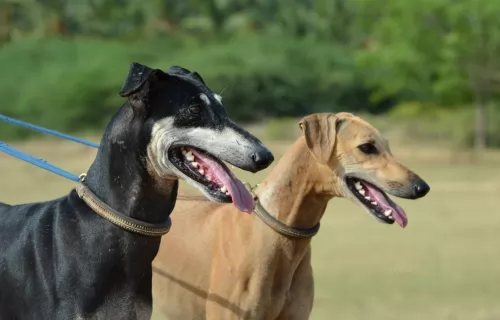 The Kanni is a low maintenance dog with his short coat. You can give him a good brush twice a week, check that his nails don't grow too long and also check his ears inside and out. Ticks and fleas are rife in hot weather and you want to give your dog a thorough check for these. You should also be checking your dog's teeth and brushing them 2 or 3 times a week. Dental problems can cause havoc with your dog's health.
The Kanni is a low maintenance dog with his short coat. You can give him a good brush twice a week, check that his nails don't grow too long and also check his ears inside and out. Ticks and fleas are rife in hot weather and you want to give your dog a thorough check for these. You should also be checking your dog's teeth and brushing them 2 or 3 times a week. Dental problems can cause havoc with your dog's health.
As a hunting breed, the Kanni is used to running so his needs for a good amount of exercise are quite high. While they do make good family pets, they hanker after wide open spaces and being busy. If you own one of these dogs, make sure that you exercise him often because otherwise he becomes frustrated and unhappy.
This dog has always been used to village life where he is free to roam wide open spaces. He is much more suited to country life than to city life, and as a pet, you will need to ensure that he receives a good amount of exercise.
Take him for walks, and if he's been socialized and trained, take him to the park and allow him off his leash to run.
The dog has always been fed traditional food such as porridge and milk but we know better now that dogs need protein too as well as a diet rich in vitamins and minerals to ensure his health.
You can feed him a top quality commercially manufactured dog food and add in some cooked chicken, rice and vegetables from time to time. It is expensive, but if you can, try and add in some raw meat occasionally as well. Your Kanni dog must always have access to fresh, clean water.
 1.Feeding the puppy – Feed a high quality large or x large puppy dogfood at least 3-4 times a day. Do not overfeed.
1.Feeding the puppy – Feed a high quality large or x large puppy dogfood at least 3-4 times a day. Do not overfeed.
2.Feeding the adult – Feed a high-quality adult large or x large dog food once or twice a day. Do not overfeed.
4. Games and Exercises – The Deerhound needs plenty of exercise in a safe place where they have plenty of room to run. A small yard or life on a leash are not enough for this energetic breed. Play fetch, course running, Like the Greyhound they will be couch potatoes if you let them but that will hurt their health. Lure Coursing or hare coursing are good. Coyote hunting. Find space where they can run for the joy of running. Never force them to run – like along a bicycle